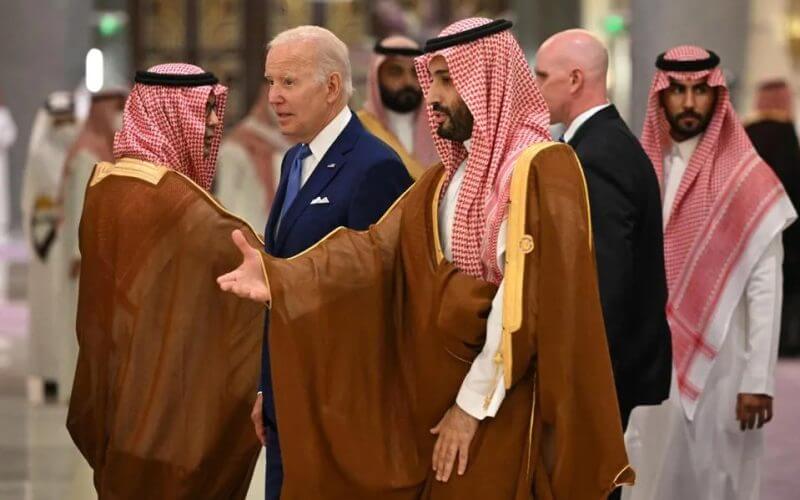New reports Wednesday revealed that the Biden administration is discussing terms for a mutual defense treaty with Saudi Arabia to create a military pact that would mirror the ones with Asian allies and normalize relations between Saudi Arabia and Israel.
According to American officials familiar with the discussions, under such an agreement, the United States and Saudi Arabia would promise to provide military support if the other country is attacked in the region or on Saudi territory.
"The U.S.-Saudi defense agreement proposed by the Biden administration should at least reach the level of strategic alliance reached by the Trump administration when it launched a global U.S.-Arab Coalition alliance in Riyadh in May 2027," explained Dr. Walid Phares, a foreign policy expert and author of ‘Iran an Imperialist Republic and U.S. policy.’
"At that time, it wasn't just Washington and Riyadh but a wide bloc of Arab and Muslim countries, and a strong U.S. commitment to support Saudi, the Gulf, and Egypt against Iranian aggression and Jihadi terror, he added.
"The alliance produced strong military cooperation, the Abraham Accords, and a massive counter-Jihadi offensive that legitimized the destruction of ISIS, the ending of the Iran Deal, and the designation of the Pasdaran as a terror organization. Saudi-U.S. relations by the end of 2020 were at the apex of cooperation and one inch away from a Saudi move to join the Abraham Accords. But the Biden administration basically crumbled these achievements," Phares told The Foreign Desk.
Current and former American officials say Saudi Crown Prince Mohammed bin Salman (MBS) regards a mutual defense agreement with the U.S. as the most critical aspect in his discussions with Washington on Israel.
Saudi officials say a strong defense agreement would help deter potential assaults by the Islamic Republic of Iran or its armed partners even as the two rivals have re-established diplomatic ties.
According to reports, U.S. officials have been discussing potential normalization between Saudi Arabia and Israel for many months.
Negotiations took a turn in June when U.S. Secretary of State Antony Blinken spoke with Netanyahu for almost an hour about each side's demands.
Senior American officials say the attempt to broker a diplomatic deal between Riyadh and Jerusalem was said to have less than a 50% chance. Since coming into power, the Biden administration has worked hard to negotiate with the Islamic Republic, giving Persian Gulf states and Israel the cold shoulder while appeasing the regime in Tehran with billions of dollars in sanctions alleviation and most recent hostage deal.
"The Biden administration proposed agreement actually goes back in time and is trying to fix the mistakes made since early 2021. First, they removed the Houthis from the U.S. terror list. That was a hit against Saudi and Gulf national security. To recognize the Houthis is like to recognize Hezbollah and or Al Qaeda," Phares said.
Such efforts, according to Phares, "deteriorated Saudi American relations."
He went on to say that efforts from the Biden White House to stop the Saudis from fighting against the Houthi rebels, the labeling of Saudi leaders as a 'pariah' state, and the Afghan withdrawal "complicated further the situation as Arab and Muslim countries saw what could happen to them if abandoned abruptly by America."
Phares noted that since 2002, the Ukraine war "forced the West to look for energy, and Saudi was a key player. The Biden administration had to change its policy towards the Kingdom and started to court MBS and his Government to help."
"What we learn is that abandoning important allies helping us against extremism and terrorism to satisfy deals with Iran and the Islamists was a grave mistake," Phares explained.
Phares notes that the U.S. has little understanding of Saudi society and its support of reforms.
According to him, the U.S. is coming back like a "boomerang to seek special relations and a defense agreement, but there are many things that have changed."
"Saudi has repositioned itself as a middle player between powers; how will this affect the agreement? Is the latter directed against Iran, while Riyadh and Tehran have normalized? Will the new deal lead Saudi to sign the Abraham accords without a resolution of the Palestinian matter," he told The Foreign Desk.
"The U.S. should support any agreement that counters terrorism with Saudi and others and also assist in setting up a Saudi-Israel agreement," Phares said.
Related Story: U.S. Officials Say Saudis Have Agreed on Outline to Normalize Ties with Israel









